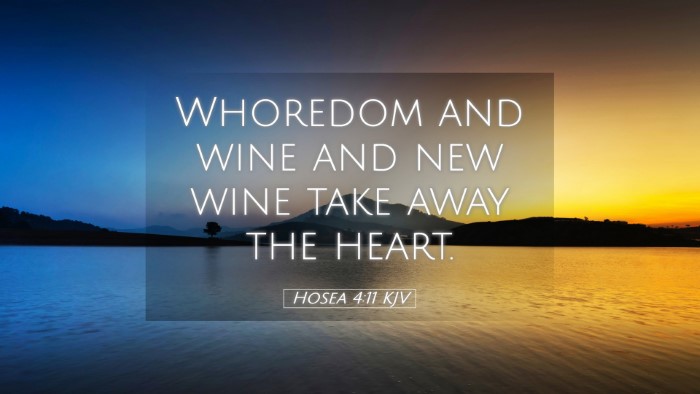Old Testament
Genesis Exodus Leviticus Numbers Deuteronomy Joshua Judges Ruth 1 Samuel 2 Samuel 1 Kings 2 Kings 1 Chronicles 2 Chronicles Ezra Nehemiah Esther Job Psalms Proverbs Ecclesiastes Song of Solomon Isaiah Jeremiah Lamentations Ezekiel Daniel Hosea Joel Amos Obadiah Jonah Micah Nahum Habakkuk Zephaniah Haggai Zechariah MalachiHosea 4:11
Hosea 4:11 KJV
Whoredom and wine and new wine take away the heart.
Hosea 4:11 Bible Commentary
Commentary on Hosea 4:11
Hosea 4:11 states: "Whoredom and wine and new wine take away the heart." This verse encapsulates the spiritual and moral decline of Israel, particularly in the context of idolatry, immorality, and the pursuit of pleasure. The commentary on this verse provides a multi-faceted understanding of its implications, drawing from the rich insights of prominent public domain biblical commentators.
General Overview
This verse forms part of a larger indictment against Israel's unfaithfulness to God. Hosea, as the prophet, speaks against the backdrop of rampant idolatry and the spiritual decline of the nation. The imagery used here reflects both the physical and spiritual intoxication that leads God’s people away from Him.
Matthew Henry's Commentary
Matthew Henry elucidates the idea that "whoredom" is a metaphor for Israel's unfaithfulness to God, representing both literal adultery and spiritual infidelity. He emphasizes the following key points:
- Unfaithfulness: Henry illustrates that the "whoredom" mentioned here signifies idolatry, where Israel seeks satisfaction outside of their covenant relationship with Yahweh, thus committing spiritual adultery.
- Intoxication: The reference to "wine and new wine" implies a state of inebriation that clouds judgment. Just as wine can lead to drunkenness, so too can the attractions of the world lead one away from God's truth.
- Loss of Heart: The phrase "take away the heart" suggests that these indulgences rob individuals of their spiritual vitality and understanding, rendering them incapable of perceiving their need for repentance.
Albert Barnes' Commentary
Albert Barnes draws attention to the consequences of Israel's indulgence in sensual pleasures:
- Judgment and Desperation: Barnes notes that such behaviors lead to divine judgment. The prioritization of pleasure above devotion results in moral decay and societal breakdown.
- Cultural Influence: He highlights the cultural context, where prosperity and the abundance of resources led to greater temptation, leading Israel down a spiral of immorality and idolatry.
- Call to Repentance: Barnes urges that this verse serves as a lament over the loss of spiritual insight, standing as a warning against superficial worship and a call to return to genuine devotion to God.
Adam Clarke's Commentary
Adam Clarke offers additional insights into the Hebrew text and cultural implications of this verse:
- Language and Meaning: Clarke emphasizes the original Hebrew language, elaborating on the term for "whoredom" (זְנוּת), linking it to the unfaithfulness of Israel's leaders who led the people astray.
- Societal Impact: He expounds on the societal ramifications of such behaviors, noting how the decline of personal morality impacts the community and leads to national ruin.
- Spiritual Consequences: Clarke warns that a heart consumed by lust and the love of worldly things cannot fully embrace the divine and the truth that leads to salvation.
Theological Implications
The reflections on Hosea 4:11 highlight several theological implications:
- God's Grievance: This scripture portrays God's sorrow over His people's unfaithfulness and the pain of watching them turn to lesser things.
- Holistic Understanding of Idolatry: It invites believers to examine their own lives and the potential idols that may take the place of devotion to God.
- Call to Renewal: The passage draws a clear path towards repentance, encouraging evaluation of both individual and communal practices that may lead to spiritual desolation.
Practical Applications
For pastors, theologians, and students alike, the wisdom encompassed in this verse and its commentaries offers several practical applications:
- Self-Examination: Regularly evaluate areas of life that may lead to distraction from God, including materialism, unhealthy relationships, and spiritual complacency.
- Teaching on Idolatry: Incorporate discussions on modern-day idolatry in sermons and teachings, drawing parallels to the idols of ancient Israel.
- Community Repentance: Create opportunities within congregations for confession and repentance, emphasizing the importance of returning to a wholehearted devotion to God.
Conclusion
Hosea 4:11 serves as a poignant reminder of the dangers of spiritual unfaithfulness. The combined insights from Matthew Henry, Albert Barnes, and Adam Clarke compel readers to consider their own relationship with God and challenge them to avoid the pitfalls of idolatry and distraction. As the church evaluates its heart, it must strive for a deeper intimacy with the Lord, one that resists the allure of worldly pleasures and remains steadfast in faithfulness.


